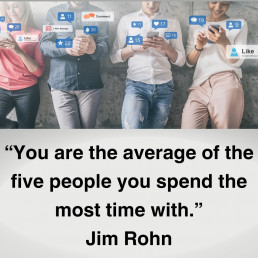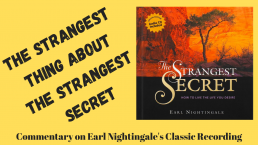"What Do You Do?"
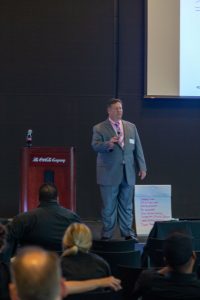 Not long ago I was on stage for a keynote presentation for Subway Development. We reached a point in the presentation where I asked,
Not long ago I was on stage for a keynote presentation for Subway Development. We reached a point in the presentation where I asked,
“What do you do?”
From the very back of the room a lonely voice I could barely hear said,
“I manage a Subway.”
I said, “What does that mean?”
She said, “Well what do you think it means?”
To which I said, “Ah, yes, you’re right! If you let me decide what it means it could mean anything! Let me rephrase the question.”
“What should I think it means?”
And she said, “Well, I’ve never thought about that before.”
Have you considered what it means to do what you do? It is a question that deserves some careful consideration. And how we answer this key question will determine not only what others think of what we do, but what we think of what we do as well.
Our work reflects who we are. It is the essence of what we think of ourselves. Adults in their 40’s and 50’s working entry level positions have a different opinion of themselves than do those of the same age in corporate positions who leave to start a business.
This is an area that deserves deep thought and contemplation. And just like my friend in the back of the room at the Subway meeting, very few people give it any thought at all.
That’s why I was there, to help them understand they must determine what they do, what their employees do, and why they do it. After working with them for over four years I helped them come up with this statement:
“I manage a unit for an international company that is the worlds largest franchise.”
Is it true? You bet. Does it sound like more than I manage a Subway. Darn straight.
And it means more to the person saying it than the person hearing it. Every time she says this, she’s reminded she’s a part of something much bigger than the task at hand.
That realization changes the way she serves the client, represents the company, and ultimately, thinks of herself.
She has an obligation to the whole. Her little part of the world just became a whole lot bigger, more important, essential.
She’s a part of something far more important than she thought. An international company is depending on her.
Perhaps you don’t work for a large organization. Maybe you’re a solopreneur. Still, have you considered,
“What do you do?”
Spend time considering the impact you have. There are clients and their families, vendors, the greater community, and of course your friends and family that are depending on you.
You are far more vital to the whole than you’ve considered. Give yourself the credit you deserve when answering, “What do you do?”
What Entrepreneurs and Small Business Leaders Can Learn from the Demise of Sports Illustrated
What went wrong at Sports Illustrated?
Last week it was announced that the publishing licensee of Sports Illustrated (SI) had missed a payment to their licensor resulting in termination of the agreement and ultimately laying off the entire Sports Illustrated staff. What happened?
For decades, sports stars and youth dreamed of the day they would end up in SI. It was the gold standard of sports reporting, and the coveted cover of the annual swimsuit issue was anticipated by millions.
But like so many other iconic brands and publications, SI may now be on the scrap heap for many reasons.
We can speculate the impact of attempts to conform to new social norms and thereby alienation of the avid SI reader. But that would only be minimal. The real target of any magazine is not the reader, but the aggregation of a group of target clients for the advertisers.
SI’s failure to embrace new media, their sluggish response to create a compelling website, their failure to focus more on reporting in depth stories that couldn’t be covered in a 24-hour news cycle, coupled with a declining interest in print media all led to this result.
Ultimately, Sports Illustrated failed to react quickly to changes in the market and how information was delivered. Any other reason is merely additional fuel to the fire that already existed.
Some will say they lost their way. From the first swimsuit issue through transgender cover models, the common complaint would be, “What did any of that have to do with sports?”
All these apparent deviations from sports reporting are merely symptoms of a brand that failed to recognize that in the span of 70 years of the publication, interest in sports and more specifically the lives sportsmen and sportswomen have changed.
And so has the way the reader consumes it and the advertisers targeting those readers.
Entrepreneurs and small business owners can learn a great deal from this demise if they’ll focus on the overall cause and not the symptoms that resulted.
This is a common failure of small business: We tend to look at symptoms and fail to trace the cause. We believe slow sales are caused by lack of selling, only to ignore the shift in our market that we’ve yet to react to.
So, here are a few take aways from the demise of Sports Illustrated.
- If you find yourself saying, “That’s the way we’ve always done it”, it’s time to make some changes.
- If you find you team not seeking new ways to do their work, it’s time to hire new people.
- If you find declining sales, don’t react radically, but react.
- If you find you’re not attracting new clients, it’s time to change your marketing.
- If you notice new clients aren’t like the old ones, you need to survey your new and old clients to find out why.
- If you don’t find yourself stunned by changes in your market, you need to pay more attention to your market.
- If you find yourself making changes that may alienate your core client, you need to determine if the change is proactive or reactive.
- If a change you are making is reactive, you need to focus more on the future of your market and company.
- If you see changes happening and find yourself saying, “That’s not going to last”, consider changing your mind.
- If you find yourself blaming the situation, you need to find your company a new leader.
Change is happening all the time. It’s the leader’s job to watch for it, anticipate it, and react to it before change forces a reaction.
Who Do You Spend the Most Time With?
"You are the average of the five people you spend the most time with." This quote by Jim Rohn changed my life. No doubt it has changed the lives of countless people. While we can debate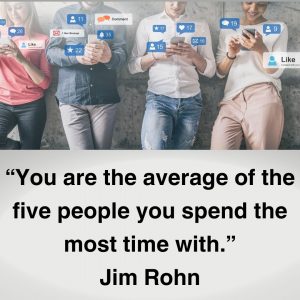 the source of the comment, there is little debate of the impact the thought put into action can have.
the source of the comment, there is little debate of the impact the thought put into action can have.
But do you know who you spend the most time with?
Spend Time With Jim Rohn and Other Masters HERE on Audible
According to Statista.com, the average internet user spends 151 minutes per day on social media channels. That’s more than 2 and ½ hours a day, nearly a full day of waking hours per week!
Time spent on social media channels is often filled with negative news, messages, and divisive comments and banter. What's more, time spent here is often taken from those we would otherwise spend time with in person.
Even when we're together, often we find ourselves embedded in our electronic world. This influences us in many ways, mostly negative.
When we do find positive messages, they often create envy and jealousy. We compare our blooper reel with everyone else's highlight reel.
This often impacts our self image resulting in negative thoughts and feelings. We spend the most time with ourselves. If you're hearing and seeing negative messages all day, it will be challenging to have positive comments and conversations with yourself.
Could we improve our inner circle simply by improving the conversations we have with ourselves? Of course. Since man obtained language it has been recorded that we’ve used repetitious language, chants, songs, and sentences to remind ourselves of things we desire to see in our lives.
Improve Your Inner Circle and Surround Yourself With New Ideas - Listen on Audible now for free!
How’s your self-talk? Not just what you verbally say, but what you think as well? Simply using your thoughts and words proactively can and will improve your life. And it will lead you to choose a better circle of "friends".
Most people love social media. I do too. But let's augment our electronic "friends" by listening to motivational, informational, and inspirational ideas.
Improve your life by improving the calibre of ideas and people you listen to. I've been doing it by listening to Audible for years. You can too!
Why Local Small Business Matters
On the way to work today I passed a ball field that is on the campus of a school. I pass this field every day on the way to work and I see the banners that festoon the fence in the outfield. But today, somehow, they meant more to me than before.
Why? What made this shift?
Today, for the first time I noticed that every banner was from a small, local business. No big brands, no on-line merchants, no international corporations. Not even the local utilities who support the community. Just local small businesses.
Now to be certain many of the banners represent businesses that are owned by parents of the children who attend the school. Some are owned by former students, and some are owned by the employers of parents of the children who attend. There are many ties that bind that result in a business that supports a school athletic program.
But not a one of those ties is the best price on products and services. Not to say they don’t have the best price for their products and services, just to say that’s not a tie that results in a business being asked to support a local school athletic program.
Yet that is the very thing that will result in a purchase for many who attend or pass the school each day. And if not the lowest price, our thoughts are certainly of the largest inventory and best service. It’s almost natural to thing “big” when buying.
I can tell you from experience, the big companies both on-line and brick and mortar don’t support small-scale needs like a local school athletic program. They can’t. It’s a matter of scale. If they supported every local school financially, they’d have to raise prices, cut inventory, or reduce staff. Doing so would defeat their unique position in the marketplace.
And that is why your local school, sports association, scout troop, charitable organization, and other groups turn to local small businesses for support. They convince themselves they’re helping these businesses promote their business. Sometimes that’s true. But more often than not the local small business is giving far more than they’ll ever get.
Small, local businesses advertise (actually, it should be sponsor) local sports, associations, charities, and local print publications in large part for a very different reason and in very different ways than large, impersonal businesses do. While large business advertising focuses on omnipresence to keep them top of mind, the local small business does so to keep them close to the heart.
The heart they’re staying close to is the heart of a thing called community. And you can’t have a community without local small businesses who make it so. They’re the people who you see at the ballfield and at church, in the local restaurant, and on the local charity board. They’re what make our communities.
This is National Small Business Week in the United States. A time to recognize the role small businesses play in our country. Two out of three new jobs will be created by small businesses.
I’d argue every week should be small business week. But just for this week, I’d ask you join in thanking a local small business for what they do with your patronage, recognition, and vocal appreciation.
Local Small Business Matters.
If you're a local small business join the movement: #GrowMyLocalBusiness
The Strangest Thing About The Strangest Secret
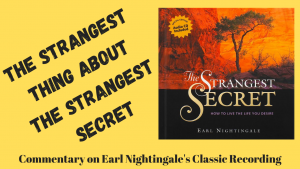 In 1956, Earl Nightingale recorded what would become the first spoken word recording to receive a Gold Record. In a recent interview with Earl's widow Diana Nightingale (View Interview Here) I learned that he recorded the message for his salesmen before he went on a fishing trip. Earl loved the water and loved fishing but he also took his role as leader very seriously. Leaving a recorded message was unusual for the day but it ensured he would communicate the tone and message in the most effective manner in his absence.
In 1956, Earl Nightingale recorded what would become the first spoken word recording to receive a Gold Record. In a recent interview with Earl's widow Diana Nightingale (View Interview Here) I learned that he recorded the message for his salesmen before he went on a fishing trip. Earl loved the water and loved fishing but he also took his role as leader very seriously. Leaving a recorded message was unusual for the day but it ensured he would communicate the tone and message in the most effective manner in his absence.
One might picture Earl sitting down to the recorder at his desk. Having written out his intended message and dressed in a dark grey Hickey-Freeman suit, freshly pressed and starched white shirt and conservative tie, his deep and comforting voice would command attention as he leaned slightly forward in is chair.
But I know Earl was far more likely to have recorded the message in a fishing shirt and a pair of jeans. You see, Earl was a real person and if you watch the interview you'll learn a lot about him and how he looked at life.
The message was intended to inspire the people in his office in his absence. It ultimately would inspire a generation, perhaps not directly with that message, but with the hundreds of thousands of messages and ideas spawned from this one simple thought, "We become what we think about."
The strangest thing about the strangest secret is that while you become what you think about, your knowledge of what is possible and available to you expands so you are constantly thinking about becoming that which you have yet to see evidence of possible.
This falls directly in line with Earl’s belief that “Success is the progressive realization of a worthy goal or ideal.”
You must think progressively in your quest to become that which you desire. The fool-hearty believe they will one day arrive at a destination of happiness or success. But true happiness is dependent upon living. Living is dependent upon growing because you are either growing or dying. And growing is dependent upon action.
You must have a need or desire to be motivated to act
You must have action to have experience
You must experience to gain knowledge
You must have knowledge to gain competence
You must be competent in one area to grow into another
You must grow in order to be living
You must be living in order to be happy
You must be happy to persist in the face of difficulty
You must persist in the face of difficulty in order to progress toward a worthy goal or ideal
In progressing to a worthy goal or ideal you are exposed to new opportunity and new experience that reveal those things possible you could not imagine.
Much has been said about having a "why" that is big enough to overcome any "how". While I agree this is important, too often we become so consumed with the "why" and the "how" that we fail to do the "what". If you're struggling to achieve that which you know you are capable of an desire to attain, stop thinking and start doing. You'll find the more you act the more you'll learn about your "how" and "why".


